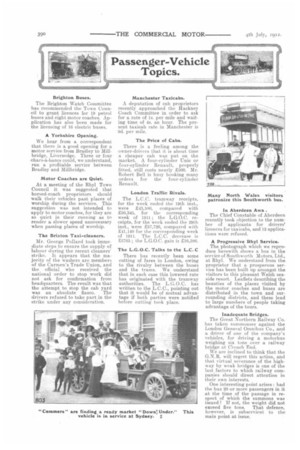( 0 . Passenger-Vehicle
Page 10

If you've noticed an error in this article please click here to report it so we can fix it.
Topics.
Brighton Buses.
The Brighton Watch Committee has recommended the Town Coun
cit grant licences for 19 petrol buses and eight motor coaches. Application has also been made for the licensing of 16 electric buses.
A Yorkshire Opening.
We hear from a correspondent that there is a good opening for a motor service from Bradley to Millbridge, Liversedge. Three or four .chars-&-bancs could, we understand, run a profitable service between Bradley and Mil'bridge.
Motor Coaches are Quiet.
At a meeting of the Rhyl Town Council it was suggested that horsed-coach proprietors should -walk their vehicles past places of worship during the services. This suggestion was not intended to apply to motor coaches, for they are so quiet in their running as to render a slower speed unnecessary when passing places of worship.
The Brixton Taxi-cleaners.
Mr. George Pollard took immediate steps to ensure the supply of labour during the recent cleaners' strike. It appears that the majority of the washers are members of the Carmen's Trade Union, and the official who received the national order to stop work did not ask for confirmation from headquarters. The result was that the attempt to stop the cab yard was an absolute fiasco. The drivers refused to take part-in the strike under any consideration. Manchester Taxicabs.
A deputation of cab proprietors recently approached the Hackney Coach Committee in order to ask for a rate of Is. per mile and waiting time of 4s. an hour. The present taxicab rate in Manchester is 9d. per mile.
The Price of Cabs.
There is a feeling among the owner-drivers that it is about time a cheaper cab was put on the market. A four-cylinder Unic or four-cylinder Renault, properly fitted, still costs nearly /500. Mr. Robert Bell is busy booking many orders for the four-cylinder Renault.
London Traffic Rivals.
The L.C.C. tramway receipts, for the week ended the 19th inst., were 143,560, compared with 150,345, for the corresponding week of 1911; the L.G.O.C. receipts, for the week ended tile 29th inst., were 157,726, compared with £41,140 for the corresponding week of 1911. The L.C.C. decrease is £6765; the L.G.O.C. gain is 116,586.
The L.G.O.C. Talks to the L.C. C There has recently been some cutting of fares in London, owing to the rivalry between the buses and the trains. We understand that in each case this lowered rate has originated with the tramway authorities. The L.G.O.C. has written to the L.C.C., pointing out that it would be of mutual advantage if both parties were notified before cutting took place. In Aberdeen Awa .
The Chief Constable of Aberdeen recently took objection to the number of applicants for drivers' licences for taxicabs, and 12 applications were refused.
A Progressive Rhyl Service.
The photograph which we reproduce herewith shows a bus in the service of Southworth Motors, Ltd., at Rhyl. We understand from the proprietor that a prosperous service has been built up amongst the visitors to this pleasant Welsh seaside resort. Leaflets describing the beauties of the places visited by the motor coaches and buses are distributed in the town and surrounding districts, and these lead to large numbers of people taking advantage of the tours.
Inadequate Bridges.
The Great Northern Railway Co. has taken summonses against the London General Omnibus Co., and a driver of one of the company's vehicles, for driving a motorbus weighing six tons over a railway bridge at Crouch End.
We are inclined to think that the G.N.R. will regret this action, and that virtual severance of the highway by weak bridges is one of the last factors to which railway companies should direct attention in their own interests.
One interesting point arises : had the bus 20 or more passengers in it at the time of the passage in respect of which the summons was issued ? If not, the weight did not exceed five tons. That defence, however, is subservient to the main point at issue.






































